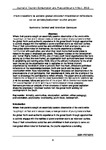From travellers to activist global citizens? Practitioner reflections on an activist/volunteer tourist project
| dc.contributor.author | Dalwai, S. | |
| dc.contributor.author | Donegan, B. | |
| dc.date.accessioned | 2018-05-18T11:15:38Z | |
| dc.date.accessioned | 2018-05-24T12:48:09Z | |
| dc.date.available | 2018-05-18T11:15:38Z | |
| dc.date.available | 2018-05-24T12:48:09Z | |
| dc.date.issued | 2012 | |
| dc.identifier.citation |
Dalwai, S. and Donegan, B. (2012) 'From travellers to activist global citizens? Practitioner reflections on an activist/volunteer tourist project', Journal of Tourism Consumption and Practice, 4(1), p.5-29 | |
| dc.identifier.issn | 1757-031X | |
| dc.identifier.uri | http://hdl.handle.net/10026.1/11584 | |
| dc.description.abstract |
Where their parents sought an essentially passive observation of the exotic while "roughing it‟ on foot and in sleeper class, a new generation of young travellers from the global North seek authentic experience in the global South through opportunities to actively engage with the realities of poverty-stricken slums as volunteer tourists. Free of their conventional social ties and uninhibited in their attempts to carve out new global citizen roles for themselves, the youths experience a bonding „communitas‟ with each other, and when they return home their social status is raised in the eyes of employers and peers. This paper focuses on the Development and Human Rights Institute (DHRI), one of many youth travel organisations that have sprung up to meet this new market, an organisation both authors have been involved in establishing and running since 2006. One of the primary motivations for the small team that set up the organisation was to capitalise on the liminal moment experienced by travellers in order to provoke them into fresh, critical and politicised reflections on the relationships between North and South and the place of their volunteerism within those relationships. The paper discusses our observations of the preconceptions of our participants, their experiences in India, and the attempts of the team to encourage the participants to reflect critically. The paper aims at polyvocality, resisting the temptation to hide the dissensus between the two authors‟ positions vis- à-vis the success, failure and potential of the project. While Brendan‟s analysis leads him to a comparison of DHRI with Paulo Freire‟s ideas of critical pedagogy, Sameena provides an analysis of how structures of racism and global capitalism shape the practices of volunteer tourists from the global North working for development in the South. | |
| dc.language.iso | en | en_US |
| dc.publisher | University of Plymouth | |
| dc.subject | Liminality | |
| dc.subject | Communitas | |
| dc.subject | Structuralism | |
| dc.subject | Activism | |
| dc.subject | Critical Pedagogy | |
| dc.subject | Postcolonialism | |
| dc.subject | Polyvocality | |
| dc.subject | Volunteering | |
| dc.subject | Youth Travel | |
| dc.subject | Development | |
| dc.title | From travellers to activist global citizens? Practitioner reflections on an activist/volunteer tourist project | en_US |
| dc.type | Article | |
| plymouth.issue | 1 | |
| plymouth.volume | 4 | |
| plymouth.journal | Journal of Tourism Consumption and Practice |


